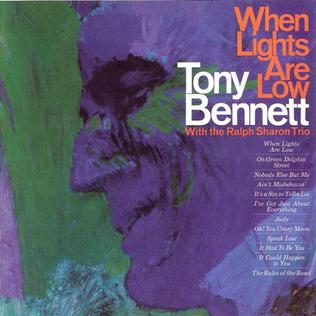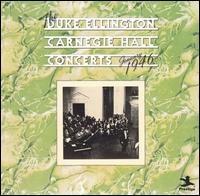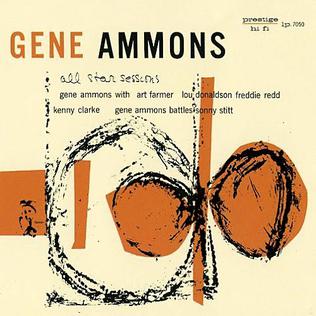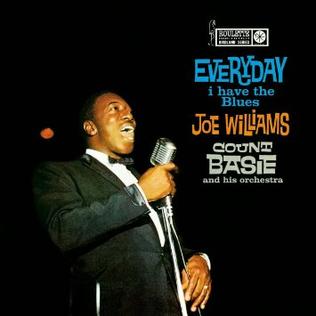
Albert George Hibbler was an American baritone vocalist, who sang with Duke Ellington's orchestra before having several pop hits as a solo artist. Some of Hibbler's singing is classified as rhythm and blues, but he is best seen as a bridge between R&B and traditional pop music. According to one authority, "Hibbler cannot be regarded as a jazz singer but as an exceptionally good interpreter of twentieth-century popular songs who happened to work with some of the best jazz musicians of the time."

Sinatra And Swingin' Brass is a 1962 studio album by Frank Sinatra.

James Mundy was an American jazz tenor saxophonist, arranger, and composer, best known for his arrangements for Benny Goodman, Count Basie, and Earl Hines.

The Blanton–Webster Band is a compilation album that combines the master takes of all the recordings by Duke Ellington's Orchestra during the years of 1940 to 1942, involving bassist Jimmy Blanton and tenor saxophonist Ben Webster. The recordings were originally made for RCA Victor during what many critics regard as the Ellington orchestra's golden period. The three CDs contain many numbers which were to become classics, and the arrangements were frequently inventive and innovative.

Count Basie Swings, Joe Williams Sings is an album by pianist/bandleader Count Basie and vocalist Joe Williams recorded in 1955 and originally released on the Clef label.
"After The Lights Go Down Low" is a popular song written by Phil Belmonte, Allen White and Leroy C. Lovett and published in 1956. It has been recorded by many artists. The major hit at time of introduction was Al Hibbler, who reached the national top 15.

Albert Omega Sears was an American jazz tenor saxophonist and bandleader, sometimes credited as Big Al Sears.

Lloyd Nelson Trotman, born in Boston, Massachusetts, United States, was an American jazz bassist, who backed numerous jazz, dixieland, R&B, and rock and roll artists in the 1940s, 1950s and 1960s. He resided in Huntington, Long Island, New York between 1962 and 2007 and prior to that in East Elmhurst, Queens, New York from 1945 to 1962. He worked primarily out of New York City. He provided the bass line on Ben E. King's "Stand by Me".

When Lights Are Low is a 1964 studio album by Tony Bennett.

Blue Rose is the debut studio album by Rosemary Clooney, accompanied by Duke Ellington and his orchestra, released in mono on Columbia Records, catalogue CL 872. Although she had appeared on albums before, it had been in the context of either a musical theater or multiple artist recording. The album also marked the return of Ellington to Columbia after an absence of four years, and was one of the first examples of overdubbing being used as an integral part of the creation, rather than for effects or to correct mistakes.

Ellington Uptown is an album by American pianist, composer and bandleader Duke Ellington recorded for the Columbia label in 1951 & 1952. The album was re-released on CD in 2004 with additional tracks recorded in 1947 and originally released as the Liberian Suite EP.

The Carnegie Hall Concerts: December 1944 is a live album by American pianist, composer and bandleader Duke Ellington recorded at Carnegie Hall, in New York City in 1944 and released on the Prestige label in 1977.

The Carnegie Hall Concerts: January 1946 is a live album by American pianist, composer and bandleader Duke Ellington recorded at Carnegie Hall, in New York City in 1946 and released on the Prestige label in 1977.

Blues in the Night is a studio album by pianist Sonny Clark, featuring performance by Clark, Paul Chambers and drummer Wes Landers. It was recorded in December 1958, but shelved until being released in Japan in 1979, as GXF 3051. All the tracks can also be found on the compilation Standards. In 2014, it was reissued on a 24-bit remastered CD in Japan, as part of a limited series. The CD also included the six original pieces from The Art of The Trio.

Out Front! is an album by pianist Jaki Byard recorded in 1964 and released on the Prestige label.

All Star Sessions is an album by saxophonist Gene Ammons recorded between 1950 and 1955 and released on the Prestige label.

Everyday I Have the Blues is an album by singer Joe Williams with Count Basie and His Orchestra featuring tracks recorded in 1959 which was originally released on the Roulette label.

Count Basie Story is a double album by pianist, composer and bandleader Count Basie featuring tracks originally performed by his orchestra in the 1930s and 1940s rerecorded in 1960 as a celebration of its 25th anniversary and first released on the Roulette label. Selections from the 2-LP set were also released as Roulette's The Best of Basie in 1962 and The Best of Basie Vol. 2 in 1964. The album was rereleased with bonus tracks in 2004 to commemorate Basie's 100th birthday.

Castle Rock is an album recorded by American jazz saxophonist Johnny Hodges featuring performances recorded in 1951 and 1952 and released on the Norgran label.
Leroy Lovett was an American jazz pianist and arranger.


















